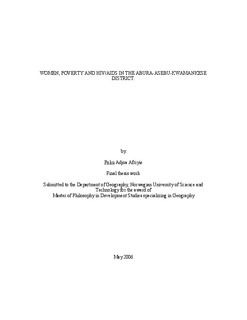| dc.description.abstract | This is about women, poverty and vulnerability of HIV/AIDS in Moree and Asebu in the Abura-Asebu-Kwamankese District in the Central Region of Ghana. The main objective of the study is to find out whether poverty actually makes women vulnerable to HIV/AIDS in the two communities, thus Moree and Asebu. The study employed the use of Actor Oriented theories such as agency, action, power and structures in structuration theory. It also makes use of risk theories, feminist geographies and the concepts of space, place and time.
Multiple methods within the qualitative approach were used, in the data collection. These included administration of a semi structured interview guide, which covered a purposive sample of 30 respondents of which 80 percent were female and 20 percent males who were ordinary local people in Moree and Asebu. 27 in-depth interviews using unstructured interview guide were conducted among key informants. Focus group discussion and observations were also conducted. The primary data was complemented with secondary data from the Ghana HIV Sentinel Surveillance Surveys, the Ghana Poverty Reduction Strategy, yearly report on HIV cases in the Abura-Asebu- Kwamankese District and the district profile of Abura-Asebu-Kwamankese District.
The study further reveals that the triggering effect of poverty to HIV infection is something that cannot be done away with. Women were seen to be worst affected with poverty. These poor conditions have led to these females adapting to various coping strategies with life, which make them vulnerable to HIV/infection. This is because women are more at risk and are likely to adopt risky sexual behaviours that could put them in high-risk position for infection. The study reveals that the masculinity of the society has made females dependent on males and this constrains them from entering into any economic venture and negotiating for protective sex. It was realised also that the causes of female poverty and the coping strategies that were likely to be adopted by the people within the fishing community is slightly different from females in the farming community. Majority of the findings were analysed qualitatively, however, I quantified only a few. Based on the findings, conclusions and recommendations were drawn. | nb_NO |
